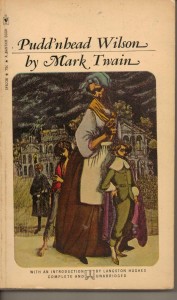Character: Roxana
Source Text: Mark Twain, Pudd’nhead Wilson and those Extraordinary Twins (1894)
Entry Author:
Roxana is a slave woman. Over many years of racial mixing in her ancestry, she no
longer appears black, the 1/16 portion remaining no longer expressing itself. To
outside observers she is white, “of majestic form and stature, her attitudes were
imposing and statuesque, and her gestures and movements distinguished by a noble
and stately grace.”(9) It is interesting to note that her white skin allows her the
agency to switch her children, an act that would denied to a black skinned black
person. Black skinned characters do not appear to have the ability to exercise
agency in any meaningful way of their own. It is only when she is heard speaking
that those who do not know her understand that she is a slave and is black. She
considers herself to be black as well, and does not find that particularly odd. She is a
nurse maid to the children of Mr. Driscoll, as well as having a child herself. She
switches her child with the child of the Driscoll’s so that he may grow up to be a free
man. Other slaves around her recognize her to be a black person. They react to her
easily as a member of their community. (9) Although Roxy is unable to pass for white
because of her speech habits, which mark her as a member of the slave caste, she
recognizes that because her master is unable to distinguish between the two
children, that she would be able to free her son from a lifetime of bondage by
exchanging him with the son of her master. This demonstrates that Roxana
understands that race is only skin deep. She doesn’t see a reason that her son
couldn’t take the place of a white boy if he looks the same. The conventions of black
inferiority do not seem to have worked themselves into her head completely. If she is
able to switch the roles of her children by switching their places, they should be able
to function in their new positions well. Unfortunately this belief that the character of
whites and blacks is fundamentally the same is untrue for her, and her child behaves
very poorly. But this is not because he is black, but because he is a product of his
environment. Like Roxy, who is white in appearance but raised and acts black, her
child raised as a spoiled white boy acts like one. Roxy is unable to take great
measures to enact her own freedom, like running for her life, she does find a way to
reclaim some power through the exchange of her child. Ultimately, Roxana
demonstrates that the character of a person is determined by their upbringing and
social status, not by the genes which they carry. Although the nature and nurture
debate is cast into a strange new realm today, where genetics are beginning to be
found to be responsible for some elements of a persons behavior, at least
pathologically, Roxana is a representative of a train of though which states that all
human behavior is rooted in nurture.

